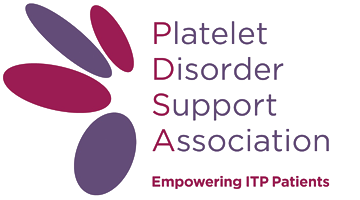For Patients
ITP Natural History Study Registry
Welcome!
The ITP Natural History Study Registry is an online registry for people with Immune Thrombocytopenia (ITP) and Other Platelet Disorders. It is sponsored by The Platelet Disorder Support Association and is hosted by the National Organization for Rare Disorders (NORD®) on their IAMRARE® platform. This registry will collect information from participants (or their authorized representatives) who are affected by ITP and other platelet disorders (ITP/OPD).
What is a Patient Registry?
A patient registry is a collection of standardized information about a group of patients who share a condition. The information may be used for a variety of purposes such as conducting natural history studies and supporting disease-specific clinical trial recruitment. The Immune Thrombocytopenia (ITP) and Other Platelet Disorders registry serves to:
- Support the design of clinical trials that explore new rare disease treatments.
- Describe the people who have Immune Thrombocytopenia (ITP) and to better understand the variability and stages of ITP.
- Understand how ITP impacts a person and their caregiver over a lifetime.
- Learn about clinical practice patterns and variations over the course of treatment.
- Help to develop best practices, management guidelines, and recommendations so that clinicians can give the best care to improve the quality of life and outcomes of people with ITP and other platelet disorders.
- Identify people with ITP who might be willing to take part in other research studies or clinical trials. Participants can choose whether they want to hear about these other studies.
What types of data will be collected in the ITP Natural History Study Registry?
The registry collects data on the following topics:
- Socio-demographics
- Medical history and diagnostics
- Treatment and disease progression
- Management of care
- Quality of life (adult, caregiver, and pediatric versions)
- Bleeding and hospitalization
- COVID-19 and ITP
- Brain bleed: Intracranial hemorrhage (ICH)
- Medical genetics and results
- COVID-19 boosters
- Physician satisfaction
Is the data secure?
The ITP Natural History Study Registry follows strict government guidelines to assure patient information is protected. The platform is served over HTTPS, which means that data is encrypted when being sent from the user’s browser to the NORD servers. The data is also kept encrypted in the NORD database. Communications between the registry application server and the database are encrypted as well. As with any information provided electronically, there is a very rare chance that privacy could be compromised. However, the registry’s security measures minimize this risk.
